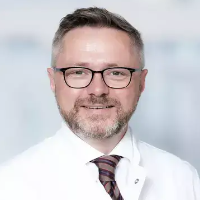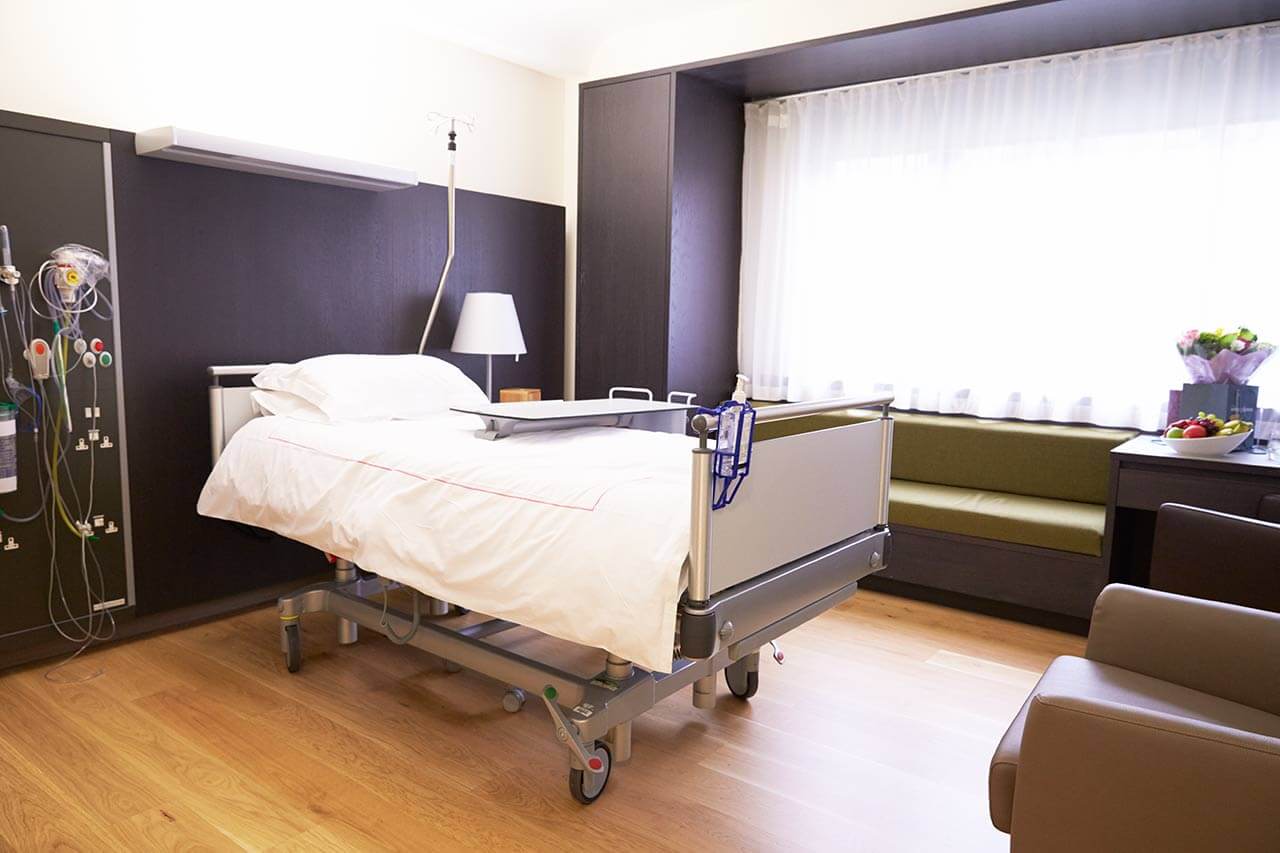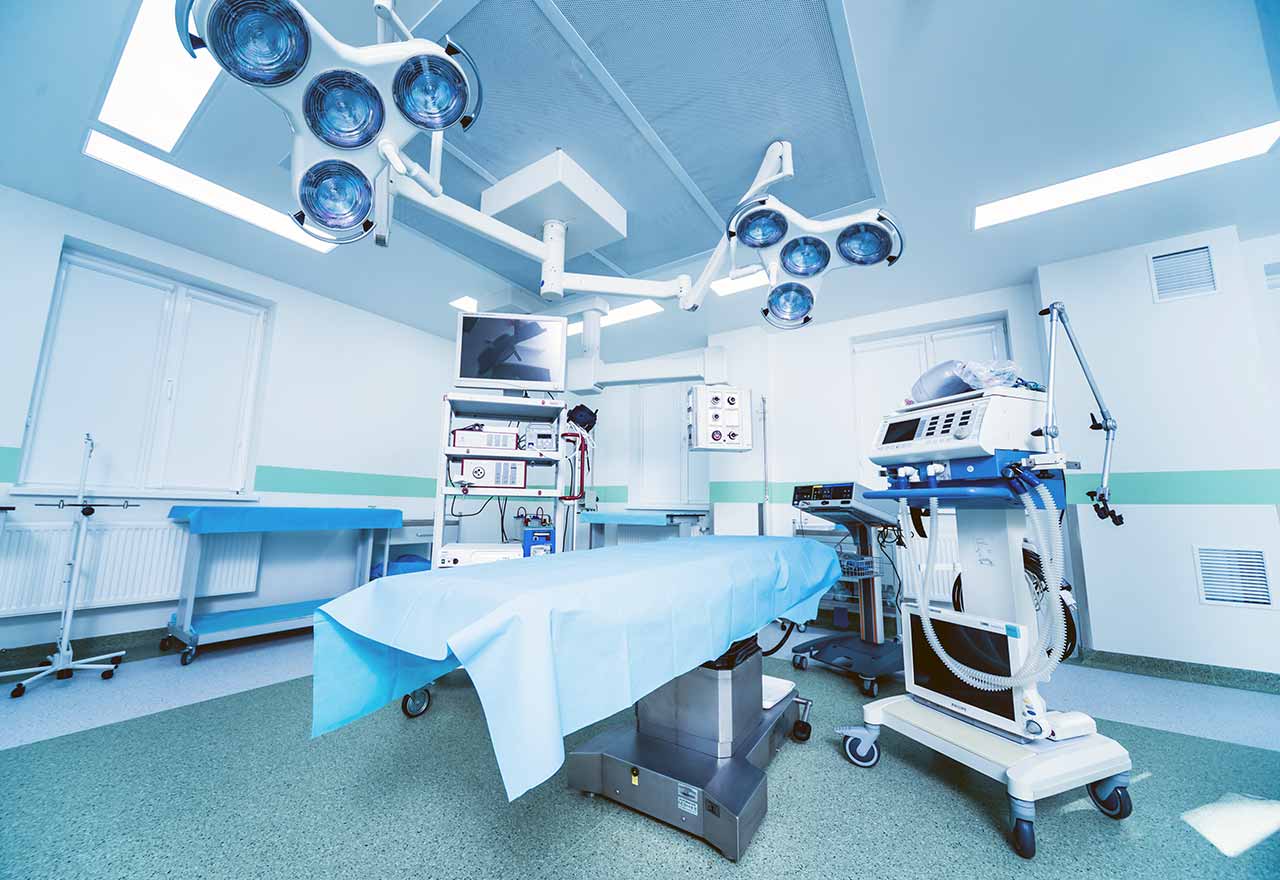
The program includes:
- Initial presentation in the clinic
- clinical history taking
- review of medical records
- physical examination
- laboratory tests:
- complete blood count
- general urine analysis
- biochemical blood test
- inflammation markers (CRP, ESR)
- blood coagulation analysis (aPTT, PT, INR)
- neurological examination
- cerebrovascular doppler ultrasound
- neuropsychological tests:
- EEG (electroencephalography)
- SEPs (somatosensory evoked potentials)
- VEPs (visually evoked potentials)
- BAEP tests (brainstem auditory evoked potentials)
- MRI of the head
(if indicated clinically, additional cost is 800€) - nursing services
- consultation of related specialists
- treatment by chief physician and all leading experts
- explanation of individual treatment plan
Required documents
- Medical records (if availale)
Service
You may also book:
 BookingHealth Price from:
BookingHealth Price from:
About the department
The Department of Neurology and Early Neurological Rehabilitation at the Albertinen Hospital Hamburg offers the full range of services in its areas of specialization in accordance with the high standards of European medicine. The department has extensive experience in the treatment of stroke, one of the most common and life-threatening neurological diseases throughout the world. The department has a certified Stroke Unit with state-of-the-art equipment for the treatment of this pathology. The department is one of the few medical complexes in Germany where stroke treatment and phase A and B early neurological rehabilitation are carried out under one roof. The department is also deservedly proud of its excellent results in the treatment of Parkinson's disease, essential tremor, multiple sclerosis, carotid stenosis, Alzheimer's disease, dementia, encephalitis, meningitis, myasthenia gravis, epilepsy, brain tumors, and other neurological pathologies. Patients in the department are offered modern treatment methods with proven effectiveness. The department's medical team consists of competent neurologists, physiotherapists, occupational therapists, speech therapists, psychologists, social workers, and specially trained nursing staff. The goal of the specialists is to provide high-quality medical services in a comfortable environment for the patient. The Head Physician of the department is PD Dr. med. Michael Rosenkranz.
The primary focus of the department's clinical practice is the treatment of stroke. This acute cerebrovascular accident often causes disability. Treatment takes place in a specialized Stroke Unit. Therapeutic options include thrombolysis (dissolution of a blood clot using drugs) and mechanical thrombectomy (percutaneous removal of a blood clot using catheter-based techniques). The department treats over 800 stroke patients every year, indicating a high level of specialization in this area. In addition to treatment, special attention is paid to prevention, and physicians perform comprehensive diagnostic examinations to assess the risk of acute cerebrovascular accident. Preventive measures are particularly important for people who have had a myocardial infarction or who suffer from arterial hypertension, hypercholesterolemia or diabetes mellitus. These conditions significantly increase the risk of stroke and require an individualized approach, including drug therapy and lifestyle modification.
The department's key area of specialization is also phase A and B rehabilitation for patients after a stroke, with Parkinson’s disease, multiple sclerosis, brain malignancies, polyneuropathies, myopathies, and after complex surgical interventions on the brain. The task of the department's medical team during the early phase of rehabilitation treatment is to maximize the restoration of lost brain functions in order to provide the person with a high degree of independence in everyday life. Phases A and B of rehabilitation begin immediately after the completion of active intensive care. Otherwise, there is a high risk of developing irreversible neurological deficits. The department has formed an interdisciplinary team of experienced specialists for rehabilitation treatment, consisting of neurologists, neuropsychologists, speech therapists, physiotherapists, occupational therapists, and specially trained nursing staff. An integral part of the rehabilitation process in the department is training on advanced robotic simulators. They are of particular value for restoring walking skills in patients with movement restrictions after a stroke or other neurological disorders. Training on simulators takes place under constant medical supervision, with the intensity and frequency of training being determined individually depending on the patient's rehabilitation potential. The department is certified in accordance with the requirements of ISO 9001:2015 in the field of early neurological rehabilitation, which indicates exceptional competence in this medical field.
The department's neurologists regularly treat patients with Parkinson's disease, which is one of the most common and complex pathologies of the nervous system. Parkinson's disease causes movement disorders, postural disorders, mental disorders, and other health problems. As a rule, the pathology affects older people (after 60 years). There is no cure for Parkinson's disease, so it is important to diagnose it early and begin treatment to slow the progression of symptoms. The first-line treatment is drug therapy, which is prescribed on an individual basis after a comprehensive neurological examination. Physiotherapy, occupational therapy, and speech therapy are also recommended. In most cases, patients with Parkinson's disease are treated on an outpatient basis.
Another priority focus of the department's clinical practice is the treatment of multiple sclerosis. The pathology is characterized by a malfunction of the immune system, against the background of which it mistakenly attacks the cells of the myelin sheath of nerve fibers. Multiple sclerosis is most often diagnosed in women, and the causes of its development are unknown. The pathology causes many symptoms, including numbness and tingling in various parts of the body, difficulty moving, an unsteady gait, decreased visual acuity, double vision, seizures, fatigue, anxiety, and depressive disorders. At the diagnostic stage, the department's neurologists carefully study the patient's medical history, perform magnetic resonance imaging and a lumbar puncture with a cerebrospinal fluid analysis, and also conduct neurophysiological studies. To date, there are no methods that would allow a complete cure of multiple sclerosis, but neurologists have effective methods for relieving symptoms and preventing the progression of the pathology and disability of the patient. Multiple sclerosis most often occurs in waves, which means that the exacerbation phase is replaced by a remission phase. In cases of exacerbation, the department's specialists treat patients with glucocorticoids in high doses and prescribe plasmapheresis and other therapeutic procedures. When remission occurs, therapy with immunomodulators (drugs that correct the functioning of the immune system) and immunosuppressants (drugs that suppress the immune response) is recommended. A treatment regimen for multiple sclerosis is prescribed, taking into account the severity of the pathology, the frequency of exacerbations, the patient's age, his or her general condition, and other factors.
The department specializes in the diagnostics and treatment of the following neurological disorders:
- Neurovascular diseases
- Stroke
- Disturbance of blood supply to the spinal cord
- Carotid artery stenosis
- Movement disorders
- Parkinson's disease and parkinsonism
- Essential tremor
- Ataxia
- Dystonia and dyskinesia
- Restless legs syndrome
- Normal pressure hydrocephalus
- Motor neurone disease
- Cognitive and behavioral disorders
- Alzheimer's disease
- Lewy body dementia
- Frontotemporal dementia
- Corticobasal degeneration
- Transient global amnesia
- Inflammatory diseases of the nervous system
- Multiple sclerosis and neuromyelitis optica
- Encephalitis
- Myelitis
- Meningitis
- Myasthenia gravis
- Epilepsy
- Paroxysmal extreme pain disorders
- Tumors of the nervous system
- Meningiomas
- Gliomas
- Lymphomas
- Diseases of the peripheral nervous system
- Peripheral nerve compression syndromes
- Polyneuropathies
- Neuromuscular diseases
- Myositis
- Muscular dystrophies
- Metabolic and toxic myopathies
- Other neurological diseases
The department's range of diagnostic and therapeutic services includes the following:
- Diagnostic services
- Ultrasound examinations
- Color duplex sonography
- Dopplerography
- Contrast-enhanced sonography
- Electrophysiological studies
- Electroencephalography
- Electromyography
- Electroneurography
- Registration of evoked potentials
- Lumbar puncture with a cerebrospinal fluid analysis
- Imaging tests
- Multimodal magnetic resonance imaging, including MR angiography
- Computed tomography, including CT angiography and CT perfusion
- Angiography
- X-ray
- Neurophysiological studies
- Videoendoscopic evaluation of swallowing
- Ultrasound examinations
- Therapeutic services
- Emergency medical care for a stroke
- Thrombolysis
- Mechanical thrombectomy
- Stroke prevention
- Preventive drug treatment (prescribed on an individual basis)
- Carotid endarterectomy
- Drug and interventional treatment of arrhythmias and other pathologies that could potentially cause a stroke
- Drug treatment of neurological diseases: pills, infusions, and injection therapy
- Physiotherapy and therapeutic exercises
- Classes with a speech therapist
- Occupational therapy
- Balneophysiotherapy
- Emergency medical care for a stroke
- Other diagnostic and treatment methods
Curriculum vitae
Higher Education and Professional Career
- Since 07.2015 Medical Director, Albertinen Hospital Hamburg.
- Since 07.2013 Head Physician, Department of Neurology and Early Neurological Rehabilitation, Albertinen Hospital Hamburg.
- 2019 Postgraduate training in hospital management, Mibeg Institute for Advanced Studies at the University of Cologne.
- 2012 Habilitation and Venia legendi in neurology, University of Hamburg.
- 2005 - 2013 Senior Physician, Department of Neurology, University Hospital Hamburg-Eppendorf.
- 2005 Additional qualification in special intensive care for neurological disorders.
- 2005 Board certification in neurology.
- 2003 - 2004 Assistant Physician, Department of Diagnostic and Interventional Neuroradiology, University Hospital Hamburg-Eppendorf.
- 2002 - 2003 Assistant Physician, Department of Psychiatry and Psychotherapy, University Hospital Hamburg-Eppendorf.
- 1999 Thesis defense and doctorate, University of Hamburg.
- 1997 - 1999 Internship, Department of Neurology, University Hospital Hamburg-Eppendorf and University Hospital RWTH Aachen.
- 1996 Internship abroad, Medical Center at New York Medical College, USA.
- 1989 - 1997 Medical studies, University of Freiburg and University of Hamburg.
Photo of the doctor: (c) Albertinen Krankenhaus
About hospital
The Albertinen Hospital Hamburgwas founded in 1907 and nowadays it is one of the largest and the most advanced medical centers in Germany. The medical facility has the status of the Academic Hospital of the University of Hamburg, thanks to which it offers the most advanced diagnostic and treatment methods, which allow the doctors to effectively cure even the most complex pathologies from various medical disciplines. The hospital is famous for the highest level of medical and technical equipment, as well as for the exceptional competence of doctors. The hospital has 1,060 beds for inpatient treatment.
The medical complex includes specialized Departments of Oncology, General Surgery, Urology, Gynecology, Cardiac Surgery, Orthopedics and others. The doctors of the hospital demonstrate high treatment success rates. The hospital has modern operating rooms for sparing minimally invasive interventions using the da Vinci Surgical System and state-of-the-art hybrid operating rooms.
The goal of each hospital employee is to combine highly effective and innovative medicine with compassionate care and an individual approach to each patient. Every year, more than 110,000 patients prefer medical care in the Albertinen Hospital Hamburg, which is an undeniable confirmation of the impeccable quality of the services provided.
Photo: (c) depositphotos
Accommodation in hospital
Patients rooms
The patients of the Albertinen Hospital Hamburg live in cozy and comfortable rooms made in light colors and modern design. Each patient room is equipped with an ensuite bathroom with shower and toilet. A standard patient room includes an automatically adjustable bed, a bedside table, a wardrobe, a table and chairs for receiving visitors. The patient rooms also have a TV and a telephone.
Meals and Menus
The patient and the accompanying person are offered tasty and balanced three meals a day. If for some reason you do not eat all foods, you will be offered an individual menu. Please inform the medical staff about your food preferences prior to treatment.
Further details
Standard rooms include:
Accompanying person
During the inpatient program, the accompanying person can live with the patient in a patient room or a hotel of his choice. Our managers will help you choose the most suitable option.
Hotel
During an outpatient program, the patient can stay at the hotel of his choice. Our managers will help you choose the most suitable option.




